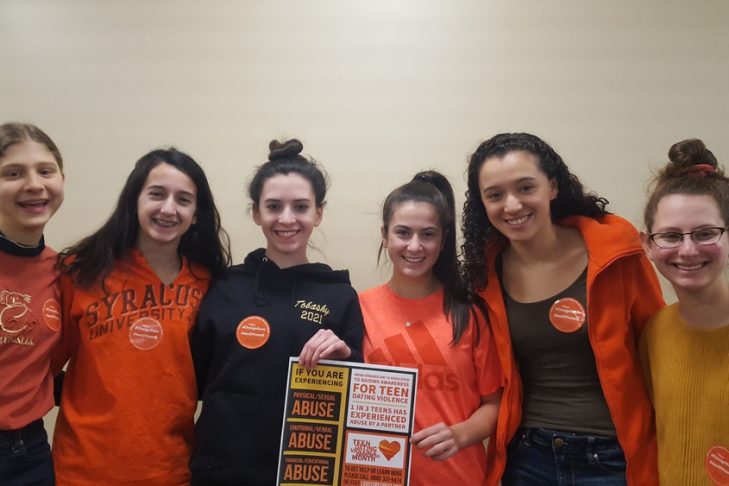Since 2014, the second Tuesday of every February has been Wear Orange 4 Love Day. This day was created to raise awareness about the prevalence of teen dating abuse. Although the entire month of February is dedicated to Teen Dating Violence Awareness, Wear Orange Day is a fantastic opportunity to show your support for others in a very simple way. Through wearing an orange shirt, shoes, jewelry or even nail polish, you can easily foster conversation and spread awareness to others. All of the members of the TeenSafe cohort are very excited to participate in this event, and we encourage you to also wear orange on Feb. 12!
Teen dating abuse can often be overlooked, but in this article, we hope to shed light on this widespread and significant issue. We will cover the many different forms of abuse, ways to help others in abusive relationships, questions to stimulate conversation, statistics about the prevalence of dating abuse and an important message for those experiencing abuse. By reading this post, we hope you learn more about this pressing issue and feel empowered to tackle this problem in your community.
5 common types of abuse in relationships and a few examples of each type:
- Physical abuse
- Hitting, slapping or pushing
- Repeatedly interfering with your sleep
- Sexual abuse
- Rape, sexual assault
- Pressuring you, not respecting your limits, embarrassing you for what you want or don’t want
- Emotional/verbal abuse
- Name-calling, body shaming, embarrassing you in front of friends
- Forcing or preventing you from going to certain places, eating certain things or dressing a certain way
- Controlling whether you can hang out with friends or go certain places
- Financial/educational abuse
- Pressuring you to always pay for things or loan money on a regular basis, treating your money like it belongs to them
- Insisting that you go to a certain college or take certain classes
- Cultural/spiritual abuse
- Saying racist/antisemitic/transphobic or other oppressive comments to humiliate or put you down
- Preventing you from spending time in a community with people who share your culture or identity
4 things to say to a friend in an abusive relationship:
- Remind them why you love them and that they deserve to be treated with love and respect.
- Tell them you want to help and talk about your own experiences in order to make the person feel like they are not different and they are not alone.
- Ask how the different abusive behaviors make them feel. For example, “When your partner tells you that you aren’t allowed to spend time with anyone else, how does that make you feel?”
- Invite your friend to talk through their feelings and don’t put the blame on them. Make it an open and honest conversation where you both are participating equally.
3 open-ended questions to start conversations about relationships:
- What do you think is important in order to have a healthy relationship?
- What are signs of an abusive relationship?
- Why do you think it’s important to know about abusive relationships?
2 important statistics about relationships:
- One in three adolescents in the U.S. is a victim of physical, sexual, emotional or verbal abuse from a dating partner, a figure that far exceeds rates of other types of youth violence.
- Despite limited research, teen dating violence seems to affect LGBTQ youth at higher rates than non-LGBTQ youth. Many educational programs on teen dating abuse and sexual assault lack information about LGBTQ experiences; only four U.S. states and the District of Columbia require school sex education curricula to include LGBTQ-specific content.
1 thought to remember if you are in an abusive relationship:
- Your feelings have value and you are not alone!
If you or someone you know needs help, the National Teen Dating Abuse Hotline is available 24/7. You can call them at (866) 331-9474, text LOVEIS to 22522 or live chat on their website.
This article was written by our TeenSafe peer leaders in collaboration with the program’s youth educator. TeenSafe, a program of Journey to Safety, is the JF&CS response to dating abuse in our community. Through leadership, skill-building and education, TeenSafe gives teens the language and tools they need to recognize abuse in a dating relationship and know how to respond if they see, hear about or experience it. To learn more about the program, schedule a TeenSafe workshop in your community or find out how teens can join the program, contact Miriam Priven at TeenSafe@jfcsboston.org.
This post has been contributed by a third party. The opinions, facts and any media content are presented solely by the author, and JewishBoston assumes no responsibility for them. Want to add your voice to the conversation? Publish your own post here. MORE


